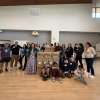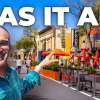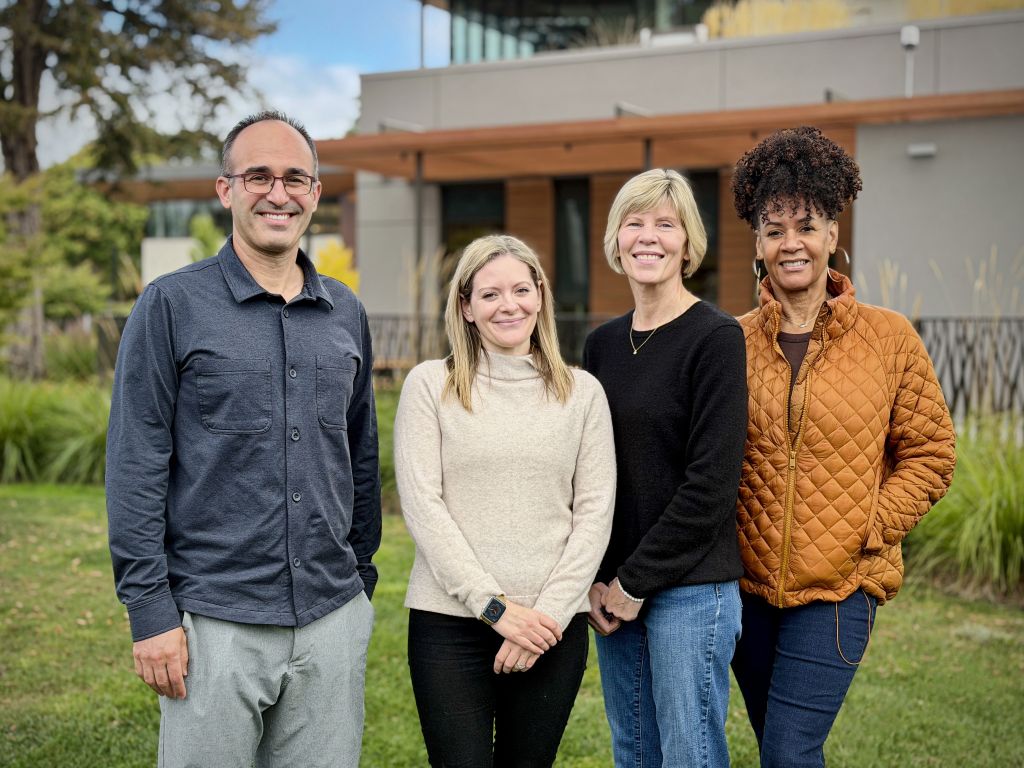650 Stories: An interview with Travis Sweeney
Travis Sweeny’s journey through a childhood in Redwood City, surviving addiction, thriving into recovery, and finding the love of his life has led the San Mateo native to father a growing family and run the lively San Mateo Zoo barbershop. Sweeney opened up his familial and charmingly old-school shop to us for an emotional, raw, and generously honest look into his life.
Can you give me a little background? Where were you born? Where did you grow up?
I was born at Stanford Hospital. I grew up in Redwood City all the way up through high school. I couldn't kind of keep my act together. So I got kicked out. I moved to Las Vegas and started selling cars in Las Vegas and that ate me up and spit me out. It was way too fast for me and I moved back to the Bay Area to live with my sister and her boyfriend.
Are you a good sales person?
I would say no. I would say I am not a good salesperson. With sales, you can sometimes not believe in the product. And you know, I was kind of uncomfortable when I felt like something was a little bit of a lie or if something was not 100 percent factual, I didn't feel comfortable in my skin doing it. I would be next to guys that could do that without blinking.
When I moved back from Las Vegas, I had gotten into some trouble and ended up in an outpatient treatment program to avoid jail time. And the outpatient treatment wasn't sufficient for me and I needed a higher level of care. And I went through a nonprofit here in San Mateo and straightened out my life and got an opportunity to work for that program. I was really content with, you know, $14,500 as my base pay, living in their transitional housing on subsidized expenses. And you know, I had a little bucket of a car but it was mine. It was the first car I ever bought for myself. I've always been under the delusion that every car I had previously was mine even though I had never earned it or paid for it. And so I worked there for several years and met a really good friend of mine who encouraged me to go back to school.
I got my degree in Human Services. I had really fallen in love with the ability to help people when they're in any situation, whether it's a family or an individual. I feel like a lot of people aren't looking for a handout, they're looking for a hand up, you know? Like ‘I just need help getting out of this hole.’
That's where I was at. I wasn't necessarily looking for a handout. I just needed somebody to get in the trenches with me and help me figure out how to get out of this hole I was in. So at that point, I applied for a job with the County of San Mateo and ended up getting that job. And I stayed there for five years. Eventually, the guy that helped me in school had come on board and started working at County as well.
We were getting notifications that with the budget cuts coming up, we could potentially be losing a position in our department. And you just take quick look around and you're like, ‘who's the last person hired?’ That person was my buddy and he had just gotten married. He's an older gentleman, probably in his fifties. And his wife wasn't a U.S. citizen and ended up getting deported to Mexico. And so you know I thought long and hard about our relationship. I thought long and hard about what he's meant to me in my life and my career and I thought about what I would do if this was me in his situation. And I thought, ‘Well, what can I do to help them?’ And at this point, I was getting my hair cut and I just had this God moment. It felt like my grandfather (who had been a barber) was speaking to me from beyond the grave. And I felt his presence, and I just had this fond memory of me being in his chair as a kid, you know, playing around on the stools and kind of like playing through the salon and sweeping up hair and the smell of all the chemicals, I just had this like really vivid memory kind of hit me. I just had this thought come to me like, ‘Why don't you become a barber?’
I had goosebumps on my arms. I had faith that the message I was receiving was from a place of love and that it was a place of guidance.
Can you tell us a bit about your wife?
I didn't have the best record of relationships nor did I have the best record for knowing my worth and knowing what I deserve in a relationship and what I'm able to get right. So there was a big break between when I started dating my wife and the previous relationship. I did a lot of work in those moments leading up to this relationship. I sensed there was something between us and I was like really excited about the chemistry - but I felt like, ‘she's not going I want to go on the second date.’
So you got married and tried to have kids. Tell us about that process and about your daughter Emerson:
I have two sets of twins in my family. Both my first cousins are sets of twins. And so when we had gotten pregnant again, lo and behold, we’re pregnant with identical twins. I laughed and she was like ‘I'm going to kill you!’ And I just felt like, at that point, God was giving us back something that we had lost with the miscarriage.
10 days before the scheduled C-section, my wife started bleeding. And so it was like 4:00 in the morning on the 26th of June 2014. We rushed to Mills Peninsula and I let the nursing staff know that we needed the doctor. I was trying to remain calm and supportive and be effective. There was just a big amount of blood at that point and the doctor said, “We need to move now.”
And so they just rushed her off and they gave me a set of scrubs to get into, and they said they'd come get me in a moment. But I knew they would never come, it was too much of an emergency. I was having that moment with God where I have a strong belief in God and I have a strong belief in a higher power and I have a strong belief that things will be OK in the long run. And I just waited and waited and cried and cried. And I saw them rush a baby off to a different part of the hospital. I just went with her and didn’t even know which baby this was or the condition of the other baby or even the mom at this stage.
I just sat there and watched them work on this child who looked pale. And I had asked about the other baby and one of the nurses had just said, you know, “I'm just going to wait for doctor.”
And that’s when the doctor came in and let me know that the baby we’d named Phoenix had died. I came into the room to see my wife and she had just been told, without me there. She had that awful cry that I'll never forget. And that scream that filled her whole body. So much mourning and so much grief.
So Emerson, the other twin, survived?
At about day seven of her life, they had confirmed that the brain damage was pretty severe. They pointed out the areas that her brain had been damaged and what those functions meant for her long-term life and what we can expect as far as care. They said we could expect her not to be able to feed herself, that she probably wouldn't be able to show any true signs of emotion, that walking might be a challenge for her, and that we could expect to take care of her for the rest of her life.
How has your daughter inspired your work with the community?
Pete Caraher (of San Mateo’s Gatepath Family Resources for special needs children and adults) reached out to me and wanted to know if he could do a haircut party for kids with special needs and adults with special needs. And my response was that I definitely want to help out and give them an opportunity to have the shop just for themselves. You know, do things to help with their sensory needs to make sure that we're not running at a high noise level where we're talking real loud and the music is going. So we tone it all down. I had a conversation with everybody that was volunteering (barbers and stylists) and let them know some of the basic things that's important to ask and to check in with these clients or the parents so I'm sure that they feel safe. And to check that the environment isn't too over-stimulating. We're continuing that this year as well and as long as I'm alive of I'm sure will continue to give back in that way.
How’s Emerson now, at three-and-a-half years old?
I'm a huge believer in prayer and prayer works and positive thinking works. And, you know, when we take Emerson back to see her doctors, they can't believe it's the same kid. She shows all kinds of emotion - a LOT of emotion. She has got a great smile and she's got a great personality. She definitely has sensory issues but it's ALL better than what the doctors had given us to believe. Watching her grow up is one of the greatest things as a parent.
How does Emerson get along with her five-month-old brother Noble?
She shows him books and will just start talking jibberish and a couple of little words will come out, because she has speech delays. So it’s going to be nice once her speech catches up to her and it doesn't pose any kind of difference.
And that’s going to happen?
I believe so, I want to believe so.
I almost feel like when she has a little bit of attitude with what she's trying to convey, it comes out clearer. But there’s always that struggle of whether or not her behavior is related to her challenges or her disability or if it's just her age.
Do you cut her hair?
I shampoo her hair, but she hates it. I think there's some sensory stuff going on there. I can't quite figure it out but, you know, we've kind of resigned ourselves to going like, ‘OK ,we're going to shampoo her hair every Sunday because it's just so traumatic and so overdrawn. I like showing her videos of other kids washing their hair. So it's a process.
It’s like recovery.
Yeah. You know, it's always been a process to keep on trying new things, to keep on trying and keep on trying until eventually, you won’t remember about all of the things that you had to do to get her to a point where she's walking. But you know that was a long process of getting her to just be able to sit up.
You’re always getting put back into the position of remembering that this is a process. And right now in my process, the end goal is really just getting Emerson to wash her hair without crying. One step at a time.










